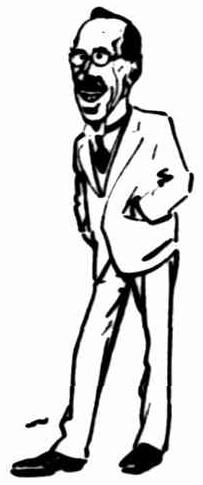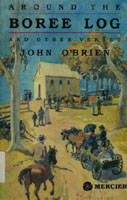Poetry at its rarest remains "the breath and finer spirit of all knowledge." It is true that the adequate presentation in prose of our experiences has required an adult type of organisation in publishing and reviewing-an organisation beginning to appear. It is true that it has required also an adult, unhesitating stance on the part of the prose writer, usually a novelist. But we can hardly suggest that poetry, because of its more primitive form of publication to-day is more childish than prose. It was childish in olden times to write histories and prescriptions in verse; and many bad kinds of verse writing to-day are childish in the worst sense. It was childish to do what the late Ella Wheeler Wilcox did, for of her it was written, "She says in verse what most of those who think with her have already said in prose." It has been childish here, too, when one good bush yarn after another, deserving to be told and retold round the camp fires until it became a brief prose masterpiece, was drearily flattened into a yard or two of jog-trot verse instead. We can contrast the limping, padded fourteener lines characterising most of these episodes in verse with the crisp prose of Lance Skuthorpe's tiny fantasy, "The Champion Bullock-driver." A prose theme dragged needlessly into verse is certainly childish, but it is not poetry.
The Poetic Idea
How does a poet decide what is fit for poetry? Onlookers may use someone's serviceable dogma: "An idea fit for poetry is on idea which, if turned into prose, still craves to be expressed in verse." Our popular balladists of the past only in the rarest instances have expressed genuinely poetic ideas; usually we must turn to those less known poets that have arisen since. Certain of these have indeed attempted to capture that finer spirit of knowledge. O'Dowd has been a significant growing-point of our literature and he has his successes. I think it is interesting and not accidental that when four of our poets published books last year each had published poems quite 30 years ago. Perhaps the spectacle of Hardy, Bridges, and now, Yeats, able to "burn brighter toward the setting sun," has begun to destroy the wicked old doctrine that no man can write poetry after 40. If Yeats had supposed that when the first flush of romantic youthful lyricism had left him his poetic expression was over, we should never have had those later miracles in which a mature man thinks aloud with his whole being.
Of William Baylebridge's recent book of sonnets, "Love Redeemed," I have written already a little. There came also Furnley Maurice's "Melbourne Odes," perhaps the eighth book by this poet. A new departure in their freedom and diversity, these odes were definitely "signed" by the poet, who published an unsigned collection, "Unconditioned Songs," in 1913. Furnley Maurice in other volumes, such as "The Gully," approached themes diffcult in themselves. If English "rural" poets are in danger of falling upon commonplaces when they now write of nightingale or daisy, these subjects each having had epithets limpetted to them for centuries, our poets have so far on opposite difficulty. They have yet to find even the barest words for the prolonged yodel of the magpie, or for the whipbird's note like a single plash into a pool. See how Furnley Maurice balances a famous refrain on the paradoxical word "soft":-
The softness of a Kookaburra's crown,
The wind puts softly up and solely down
His eyes of love that almost humanly speak
Peering in softness o'er that murderous beak!
In "Melbourne Odes," using the same freshness of attack he has set himself to suggest a modern city, its literal rectangles of street and building, its noise and glare, then the contradiction of its soaring towers and over those towers the more incredible sky.
Macartney and Shaw Neilson
Frederick Macartney's "Hard Light" was written in a serviceable anger, his Dr. Fell being a place, Darwin. Using many lyrical forms and varieties of mood he finally tears himself away. Under his scornful touch the region with its subtle tortures and oddly beautiful mitigations is made alive, as it could hardly have been by songs of direct praise. There is a clearcut intensity in this hard light, making the reader glad to look up the poet's earlier books. The fourth of last year's books was Shaw Neilson's "Collected Poems" -- all the poet is willing to acknowledge -- and we can only guess at a postscript. It is curious to remember that Shaw Neilson began as one of the balladists in the 'nineties though not at ease in that galley. Then came some of his velvet-smooth lyrics with their suggestion of escape from a Mallee township into a world of conservatories, but soon he found his own poise, and it came from the very "poor country" he had best known.
The blue cranes fed their young all day-how far in a tall tree!
And the poor, poor country made no pauper of me.
His runaway rhythms are delicately his own:-
When thou art gone a little way
I am in a cold fear:
The day like a long sickness is,
And I count the moon a year.
I fool it on the mist, - the heart
Renounces liberty.
These four poets, working apart, would probably agree in their literary outlook. Probably, too, if Robert Fitzgerald were to publish a new collection. It would have some harmony with them. Fitzgerald has a robustness, while at the same time being the chief Australian to adapt the rhythms of the later Yeats.
There are movements in another direction. For instance, Bertram Higgins's most significant poem, "Mordecaius Overture," has gradually penetrated the inquiring literary consciousness. While disagreeing with some of his dogmas as a guide to writers less creative than himself -- for he has taught them to reject images from the life around them, as if what had never yet found expression were already outworn -- I cannot "disagree with" his work itself, which is difficult, original, and profound. (A little foreigner once gave me, as his reason for going to Sydney by train, "I do not agree with the sea.") Higgins's explicit influence has been in the direction of a rather sterile intellectualism, producing sharpshooters and not singers, but his example has been salutary where it has not been overwhelming. His associates, who in most instances would choose to be called his followers, include two who have published in book form -- Edgar Holt and Clive Turnbull, each with passages of individual brilliance interrupted by pieces so frankly in the manner of T. S. Eliot, as to be intended surely as studies. The course of this movement is impossible to foresee, and a guess is made no easier by the presence, on the circumference, or another poet of great skill, D. P. McGuire. One thing is clear, it wears no kind of moleskins; as for the alternative the belltenner, what form would it take in 1935?
First published in The Argus, 16 March 1935


